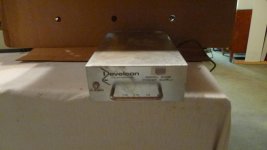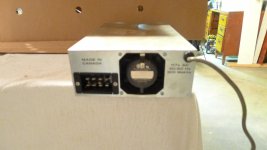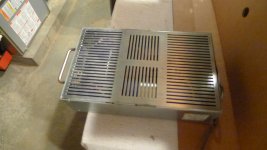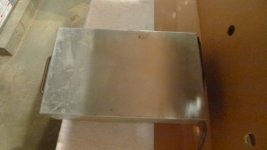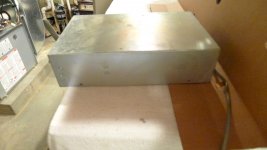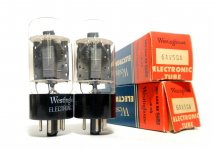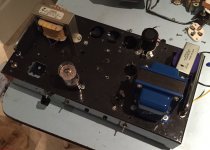Member
Joined 2009
Paid Member
My own waiting-to-be-built-for-several-years 2a3 amp is a dc coupled design with 500v B+ and also mono - that's for another day to build. But I have ten Russian 6s4s tubes, kind of equivalent to 6a3 i.e. they are like dual-plate 2a3 only with a 6.3V heater. Clearly enough tubes for a stereo amp and closer to what you are planning. I also have a single ended 6as7 amp I don't use anymore that I can salvage a pair of Hammond 125ESE output transformers from, some power supply chokes, a tube rectifier and a power transformer. Maybe I can put together something rather close to what you are doing but re-using what I have. I'd start over with a new chasis. Hobby time is rather limited these days so the best way fwd for me would be to commit to building on the final chasis right from the get-go. I'll do a parts inventory this weekend if I can.
Last edited:
Member
Joined 2009
Paid Member
You'll want a volume control pot.
Otherwise, you may not need anything. The 2A3 filaments may balance out nicely and you'll not need a hum-balancing pot at all. The bias will likely be auto-bias which means no adjustments necessary (or desired).
Otherwise, you may not need anything. The 2A3 filaments may balance out nicely and you'll not need a hum-balancing pot at all. The bias will likely be auto-bias which means no adjustments necessary (or desired).
Member
Joined 2009
Paid Member
Ron,
Hose 6c4c tubes I have will need DC filament supplies to avoid hum, which is another level of hassle, plus they each need a separate power transformer winding. I looked around my hobby room and I don't have a suitable power trafo. I don't know if I have patience to go with dc heating. So, next option is a different output tube with indirectly heated cathodes. I could grab a couple of those 6av5's. That would get me in the game here - using transformers that I already have on-hand.
Hose 6c4c tubes I have will need DC filament supplies to avoid hum, which is another level of hassle, plus they each need a separate power transformer winding. I looked around my hobby room and I don't have a suitable power trafo. I don't know if I have patience to go with dc heating. So, next option is a different output tube with indirectly heated cathodes. I could grab a couple of those 6av5's. That would get me in the game here - using transformers that I already have on-hand.
Member
Joined 2009
Paid Member
Hi Bigun, I started another project and it too uses 6AV5GA's. Triode wired the curves look identical to the 2A3. I was thinking push pull, something like the Brook 12A.
Member
Joined 2009
Paid Member
I dug up some bits n pieces and my experimental chasis - which is getting to be a bit of a mess.
I got an Edcor XPWR105 which provides 180-0-180 at 250mA and a single 6.3V winding good for 3A. I figure a SS bridge rectifier across the HT winding and fed into an inductor will give me a B+ of around 300V and I'll tweak it with a small input cap to get the voltage up if I want. I also got a Hammond 270FX 275-0-275 but it's wired into another amp right now - one which I don't mind stealing from if necessary.
I got an Edcor XC87-2H-300mA choke to use as the 'choke input' for the bridge rectifier. This might not be enough Henry's but I also have a pair of Hammond 158M's in the other amp which would give me 10H at 100mA. The Edcor has the benefit of being screwed onto chasis already and would suffice providing I'm drawing a decent current through the power output tubes.
And I got a Hammond 125ESE output transformer on there too, mounted well away from the power transformer and that choke - which will be the source of a nasty pulsed magnetic field so it's hiding over at the back corner there.
The one tube you can see there is a 6AV5 I got recently off ePay.
Nothing wired up yet though.
I got an Edcor XPWR105 which provides 180-0-180 at 250mA and a single 6.3V winding good for 3A. I figure a SS bridge rectifier across the HT winding and fed into an inductor will give me a B+ of around 300V and I'll tweak it with a small input cap to get the voltage up if I want. I also got a Hammond 270FX 275-0-275 but it's wired into another amp right now - one which I don't mind stealing from if necessary.
I got an Edcor XC87-2H-300mA choke to use as the 'choke input' for the bridge rectifier. This might not be enough Henry's but I also have a pair of Hammond 158M's in the other amp which would give me 10H at 100mA. The Edcor has the benefit of being screwed onto chasis already and would suffice providing I'm drawing a decent current through the power output tubes.
And I got a Hammond 125ESE output transformer on there too, mounted well away from the power transformer and that choke - which will be the source of a nasty pulsed magnetic field so it's hiding over at the back corner there.
The one tube you can see there is a 6AV5 I got recently off ePay.
Nothing wired up yet though.
Attachments
Last edited:
Member
Joined 2009
Paid Member
Fixed Bias
Although I expressed my recommendation for the simplicity of cathode-bias I realize that this is not based on direct experience. I've never tried fixed bias. It seems only fair to Ron to open the debate about this since there are many who believe fixed-bias is the best way in terms of sound quality, even though we'll need some bias-setting potentiometers. It also removes the need to extract every last volt out of the power supply and rectifier because we'll be gaining some headroom if we switch to fixed bias and we won't be dissipating heat in cathode resistors.
Those of you with more experience that me - what do you say about use of fixed bias, is it worth the 'hassle' of a negative supply voltage and bias setting procedure ???
Although I expressed my recommendation for the simplicity of cathode-bias I realize that this is not based on direct experience. I've never tried fixed bias. It seems only fair to Ron to open the debate about this since there are many who believe fixed-bias is the best way in terms of sound quality, even though we'll need some bias-setting potentiometers. It also removes the need to extract every last volt out of the power supply and rectifier because we'll be gaining some headroom if we switch to fixed bias and we won't be dissipating heat in cathode resistors.
Those of you with more experience that me - what do you say about use of fixed bias, is it worth the 'hassle' of a negative supply voltage and bias setting procedure ???
There are pluses and minuses to everything. A "gotcha", especially with DHTs, is grid to ground resistance limit. "Fixed" bias has a lower limit. Exceed the limit for the specimen being used and the tube runs away. 😡 
Early in this thread, I suggested using a MOSFET buffer between the voltage amplifying circuitry and the "final". Then, a small/safe grid to ground resistance can be used without fear of lost gain or other undesirable loading effects.
Another technique is to use combination bias. With indirectly heated types, I recommend a 100 Ω resistor bypassed by a 470 μF. 'lytic. However, 100 Ω might not provide sufficient protection for a "touchy" DHT.

Early in this thread, I suggested using a MOSFET buffer between the voltage amplifying circuitry and the "final". Then, a small/safe grid to ground resistance can be used without fear of lost gain or other undesirable loading effects.
Another technique is to use combination bias. With indirectly heated types, I recommend a 100 Ω resistor bypassed by a 470 μF. 'lytic. However, 100 Ω might not provide sufficient protection for a "touchy" DHT.
Member
Joined 2009
Paid Member
For combination bias I'd be looking for the cathode resistor to be around 1/gm of the tube, so you'd want more like 200 Ohms ? But now you have a cathode bypass capacitor and the complexity of fixed bias supply circuitry - the worse of both worlds.
I wish I had heard the two different approaches with the same basic amp. Perhaps this is something I will have to try out here.
I wish I had heard the two different approaches with the same basic amp. Perhaps this is something I will have to try out here.
Last edited:
You can eschew the bypass cap., when combination bias is employed. O/P impedance goes up, but so does linearity. In the case of the 300B, with its (IMO) excessive 2nd order HD, the increased linearity rates to be a blessing.
Once again, pluses and minuses.
BTW, Nichicon offers several series of 'lytics purportedly suited to the signal carrying role. The KZ series definitely has its following.
Once again, pluses and minuses.
BTW, Nichicon offers several series of 'lytics purportedly suited to the signal carrying role. The KZ series definitely has its following.
Last edited:
I've never tried fixed bias.
i did in my EL34 pp amp build, but since the owner wanted to tube roll and complained of the heat, i changed it to cathode bias....no audible difference, owner is happy, the amp runs cooler....
Member
Joined 2009
Paid Member
Why does it affect the heat, aren't you swapping heat from the Cathode resistor for heat in the power tube ?
because the output tubes were biased hot close to the max plate dissipation, more plate dissipation means more power traffo heating.....fixed that with cathode resistor bias...
All my cathode biased amps run hotter.
Anyone hear from Ron? I hope he is okay. I emailed him maybe a week ago and got no response.
Anyone hear from Ron? I hope he is okay. I emailed him maybe a week ago and got no response.
Member
Joined 2009
Paid Member
Member
Joined 2009
Paid Member
Darn, I only got two Cree diodes, I need 4 of them to make a bridge for my power supply so no soldering this weekend. I'll have to order some parts.
He's OK, as of 2 days ago at least.
Very good to hear!
I hope to turn on a soldering iron myself sometime soon.
Me too! I wanted to play around with my 6AV5 amp but no such luck. I also got commissioned by my bass player to finally make him a tube stereo amp to power some Klipsch Heresy II's so my personal projects are on hold. He wants EL34 SE, so that's my only stipulation. Well that and a budget of $300. Should be doable, he has a quad of EL34's already so that's a plus.
I wonder how Ron is making out with his build. Maybe we will get an update this weekend from him.
- Status
- Not open for further replies.
- Home
- Amplifiers
- Tubes / Valves
- 2A3 driver
